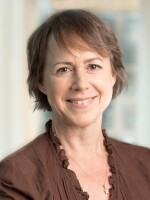STEVE INSKEEP, HOST:
New York City's 92nd Street Y has been adapting to the pandemic. This institution has seen a lot. The nonprofit cultural center was founded in 1874 as the Young Men's Hebrew Association. It survived the Great Depression. It survived 9/11. When I lived in New York City, you'd always see posters or newspaper ads for big-name celebrities at live in-person events of the very sort that you cannot hold now. So the Y's virtual programs have gone ahead, and they are a pandemic success story of a sort. Here's NPR's Elizabeth Blair.
ELIZABETH BLAIR, BYLINE: Pre-pandemic, the 92nd Street Y's entire business model was based on in-person experiences. Tickets to events and tuition for classes made up 70% of its budget.
SETH PINSKY: The only opportunity we really had to survive as an institution was to lean into the crisis.
BLAIR: Within four days of shutting its doors, the Y started streaming its events. CEO Seth Pinsky says the audience for its virtual programs is bigger than they've ever seen. In a typical year, about 300,000 people attended events. In the past six months?
PINSKY: We've had a total of about 3.4 million viewers since we closed our doors.
BLAIR: From 300,000 in a year to 3.4 million in six months. Even online, the 92nd Street Y's programming is wildly eclectic - politics, pop culture, business. Leading chefs like Amanda Cohen had a panel discussion about the restaurant industry.
(SOUNDBITE OF ARCHIVED RECORDING)
AMANDA COHEN: I think we all know, as restauranteurs, certainly in the States, that the system was broken.
BLAIR: Musicians like Jonathan Biss have performed from their homes.
(SOUNDBITE OF MUSIC)
BLAIR: And Hugh Jackman signed up to take a virtual film class with the 92nd Street Y and then did a one-hour interview with the teacher, Annette Insdorf.
(SOUNDBITE OF ARCHIVED RECORDING)
ANNETTE INSDORF: Did you study footage of Frank and notice that he did those things?
HUGH JACKMAN: That's a great question. I studied a lot of footage. I worked with a researcher who...
BLAIR: There have been some technical difficulties...
(SOUNDBITE OF ARCHIVED RECORDING)
PAMELA ADLON: Mario, you hit your mute button. I can't hear you.
BLAIR: ...Like the time Pamela Adlon couldn't hear her interviewer, actor Mario Cantone.
(SOUNDBITE OF ARCHIVED RECORDING)
MARIO CANTONE: Can you hear me now? No.
ADLON: Yes.
CANTONE: I can't hear her, either.
BLAIR: But the 92nd Street Y isn't letting the glitches deter them.
SUSAN ENGEL: There is an element of forgiveness right now.
BLAIR: Susan Engel has been curating events for the Y for nearly 40 years.
ENGEL: If you engage the life of the mind at this time, you are giving people such a service.
BLAIR: And they're selling tickets. Some programming is free, but they've also generated over $3 million in revenue. Still, CEO Seth Pinsky says, despite the income and the massive audience increase, they've had to furlough staff and cut salaries.
PINSKY: The hardest part of all of this is that, in spite of all the successes that we're having, the economics still don't work. And we've been operating on fumes.
BLAIR: Pinsky says he hopes, going forward, the 92nd Street Y can crack the code on how to make this new virtual, now global model a sustainable one. Elizabeth Blair, NPR News.
(SOUNDBITE OF ANKO'S "RAIN") Transcript provided by NPR, Copyright NPR.



